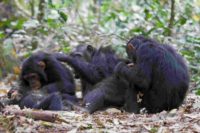By Dr. Danny R. Faulkner Happy summer solstice. The summer solstice, or alternately the June solstice, occurred at 6:07 a.m. EDT on June 21, 2018. …read more Source: AIG Daily
By Sarah Chaffee On this episode of ID the Future, engineer, lawyer, and computer expert Eric Anderson continues his discussion hosted by Mike Keas on what it means that there’s information in DNA, and how this distinguishes it from most other physical objects. He talks about what intelligence really is and does — and why we know it’s involved in creating the unique information in DNA. And he recommends an answer we can give to those who “dig their heels in” and disagree on what information is about. Please consider donating to support the IDTF Podcast. Your browser does not [More]
By Ken Ham During a roundtable discussion in the White House, US President Donald Trump referred to members of the violent gang MS–13 as “animals.” …read more Source: AIG Daily
By Sarah Chaffee On this episode of ID the Future, host Robert Crowther talks with Rachel Adams, special projects coordinator at Discovery Institute’s Center for Science and Culture, about Thanos, the arch-villain from the Marvel blockbuster Avengers: Infinity War, and a couple of real-life thinkers, Eric Pianka and Paul Ehrlich, who share the villain’s view that the world would be a better place with far fewer humans. Thanos, Pianka, and Ehrlich appear to share a materialistic view of the human person, one that ignores the inherent dignity and worth of every person as well as humanity’s capacity to create solutions [More]
By Sarah Chaffee In this episode of ID the Future from the vault, Jay Richards interviews Jonathan Witt about Witt’s book, co-authored with William Dembski, titled Intelligent Design Uncensored. What is ID? Why is it controversial? This book breaks down the science of intelligent design into easy to understand terms and looks at other key cultural questions. Read a full review of the book here. In addition to discussing the book itself, Richards and Witt reveal autobiographical details of how they got involved with intelligent design. Please consider donating to support the IDTF Podcast. SaveSave …read more Source: id the [More]
By Creation Moments God was not pleased with the people of Babel when they wanted to build a city and a tower with its top in the heavens. This is because their aim of preventing their own dispersal throughout the world was in contravention of God’s command, and their intention to make a name for themselves is opposite to our commitment to seek God’s glory. read more …read more Source: Creation Moments
By Todd Friel We are right only because God has taught us to know what is right. How quickly we can forget that. …read more Source: AIG Daily
By Sarah Chaffee In this episode of ID the Future, Mike Keas interviews attorney and engineer Eric Anderson about the first of two mistakes ID antagonists often make regarding information in nature. There is information to be gained about natural phenomena, like Saturn’s rings for example, but is there information actually in Saturn’s rings, or is that information produced by intelligent agents studying Saturn’s rings? The answer to that question should be clear — and it makes a huge difference in how we understand information and intelligence. Please consider donating to support the IDTF Podcast. SaveSave …read more Source: id [More]
By Ken Ham God has been doing great things around the world through Answers in Genesis. We’re increasingly seeing how vital this ministry is in equipping the church, not just here in North America but also in nations across the globe. We’re seeing people especially hungry for answers in the Hispanic world. Learn more about Dia Latino at ArkEncounter.com and CreationMuseum.org. Thanks for stopping by and thanks for praying,Ken This item was written with the assistance of AiG’s research team. …read more Source: Ken Ham AIG
Examining pre-Flood geographical details in the biblical record. …read more Source: creation.com
By Creation Moments In a previous Creation Moment, we saw how people often do not want hygienic teaching. The Greek word translated “sound”, in the phrase “sound teaching”, is actually hugiano, from which we derive our word hygienic. read more …read more Source: Creation Moments
By Ken Ham Reportedly, LGBT activists got upset with Twitter CEO Jack Dorsey for eating at Chick-fil-A, especially in June during so-called “Pride Month.” …read more Source: AIG Daily
By Creation Moments The Apostle Paul wrote: “All Scripture is breathed out by God.” Some versions have: “All scripture is given by inspiration of God.” This means the same thing because the word inspiration has changed its meaning somewhat over the centuries. Colloquially, we remark that a brilliant inventor had an inspired idea, but that is not really what is meant by inspiration in this context. read more …read more Source: Creation Moments
By Ken Ham Here at Answers in Genesis, we’re committed to equipping your family to think biblically. To help with this, we’re constantly producing brand-new resources. Each of these resources is designed to help you grow in a biblical worldview and share the message of biblical authority and the gospel with others. They are products with a purpose! My Giant Created Kinds My Giant Created Kinds Fun Pack gives great truths about animals, especially extinct ones of the giant variety. Kids love learning about animals, especially extinct ones of the giant variety. But most of the information available for our [More]
By Creation Moments Perhaps you played the telephone game at children’s parties. The participants are seated in a line, or maybe a ring. One person starts by whispering a phrase to his or her neighbor. That neighbor whispers the message to the next person. Eventually, the message has gone around the room. But when the final person speaks the message out loud, it usually does not bear too much resemblance to the original. read more …read more Source: Creation Moments
By Ken Ham Father’s Day is this weekend! We should have a happy, positive message to share with you—right? Well, I’m going to relay a sad Father’s Day message, but with a challenge to us all. One of my favorite passages in the Bible is in Joshua 4, where we read the account of the Israelites miraculously crossing the Jordan River. God told Joshua to get the people to have 12 men gather 12 stones from the river and build a memorial so that: When your children ask their fathers in times to come, “What do these stones mean?” then [More]
When someone rejects biblical teaching in one area, it shouldn’t surprise us when they end up eventually rejecting all of it. …read more Source: creation.com
By Creation Moments “How can you possibly believe the Bible to be inerrant?” the argument goes. “We don’t even have the originals. The originals might be different from the Bible we have today.” This is a common enough argument against inerrancy but is born out of a misunderstanding about the nature of original documents. read more …read more Source: Creation Moments
By Ken Ham The Answers in Genesis ministry is quickly growing, and, as we do, our staff grows! We’ve been welcoming many new staff members, and we’re still hiring for a wide variety of positions. As of this writing, our AiG staff, including full-time, part-time, and seasonal employees at our attractions, exceeded 1,000 people! We’re so thankful for the hundreds and hundreds of talented individuals God has brought together to do everything that needs to be done to keep a ministry of this size running smoothly. It’s a great (and ever-growing) team! Here are just a few of the …read [More]
By Ken Ham Dads have the tremendous privilege and God-given responsibility of leading their families and bringing their children up in the training and admonition of the Lord (Ephesians 6:4). In our increasingly secular age, equipping our children to think biblically is becoming more difficult. The secular culture is seemingly doing everything it can to lead our children away from the truth of God’s Word (ultimately this is because it’s a spiritual battle). Equip your husband, father, or son to lead by sending him to our Equipping Families to Stand conference, coming to the Creation Museum July 16–20, 2018 here [More]
By Ken Ham The Christian Post ran a piece on the question, “Is Jesus the only way?” That is, do only those who repent and believe receive eternal life? …read more Source: AIG Daily
By Creation Moments “The time is coming,” said the Apostle Paul to his young protegé, Timothy, “when people will not endure sound teaching.” read more …read more Source: Creation Moments
By Ken Ham I’m excited for our friends at Living Waters ministry who’ve recently announced a new season of their award-winning TV program, Way of the Master. Though it has been on hiatus for a few years, this very popular show aired in over 190 countries, equipping believers to share their faith boldly with everyone they meet. And you can help bring Way of the Master back! For 15 years, this syndicated show has encouraged believers all over the world—and has challenged atheists, nominal Christians, and followers of other religions to consider the claims of Christ and believe the gospel. [More]
By Sarah Chaffee On this episode of ID the Future, philosopher Jay Richards continues his conversation with host and historian of science Mike Keas about Henry Kissinger’s recent Atlantic article on “The End of the Enlightenment.” In the piece, Kissinger sounds an alarm over artificial intelligence, and raises questions about machine ethics and the possibility that humans may learn we’re not so special after all. Richards, author of the new book The Human Advantage: The Future of American Work In an Age of Smart Machines, pushes back, explaining how we can continue to use artificial intelligence to our advantage, prudently [More]
By Sarah Chaffee On this episode of ID the Future, Jay Richards talks with host Mike Keas about a recent Atlantic article from former National Security Advisor Henry A. Kissinger on “How the Enlightenment Ends” with the rise of artificial intelligence. Richards, whose forthcoming book The Human Advantage: The Future of American Work In an Age of Smart Machines, covers this territory and more, explains that AI is about statistical processing, not budding consciousness; and the ethical concerns it raises are both important yet in some ways not so new. Please consider donating to support the IDTF Podcast.
By Creation Moments A recent report in the journal Science has reached the startling conclusion that human brains and chimp brains are entirely different. A study led by scientists at Yale University has discovered that much of the gene activity in the human brain is completely alien to that occurring in the brains of chimpanzees. read more …read more Source: Creation Moments
By Ken Ham Answers in Genesis is growing around the world, including in my home country Down Under. We’re excited that Australians and Kiwis (those in New Zealand) can now order resources directly from Australia—no more high international shipping costs from the US. Most of these powerful life-changing AiG resources—the leading creation-apologetics books, DVDs, curricula in the world—have not been readily available in these countries until now. As Western nations—including Australia—continue to become more secularized, Christians need to get equipped to give answers to the skeptical questions of our day and to think biblically. We hope this new online store [More]






































